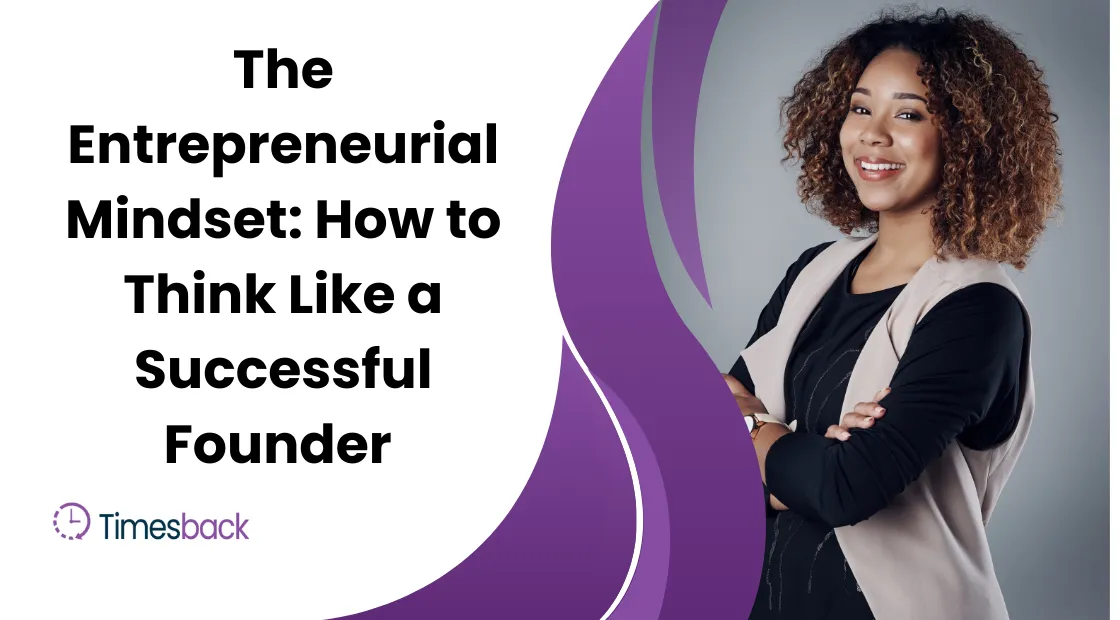L'état d'esprit entrepreneurial : comment penser comme un fondateur à succès

Le esprit entrepreneurial Il ne s'agit pas seulement de créer une entreprise, c'est une façon de penser qui distingue les visionnaires des suiveurs.
Annonces
C'est la capacité de voir des opportunités là où d'autres voient des obstacles, d'accepter l'incertitude et de poursuivre sans relâche la croissance.
Mais qu’est-ce qui définit exactement cet état d’esprit, et comment peut-on le cultiver ?
Dans un monde où 901 000 000 startups échouent (selon…) Forbes), le succès repose souvent sur la mentalité plutôt que sur le capital ou la chance.
Annonces
Les fondateurs qui réussissent ne se contentent pas d'exécuter des idées ; ils s'adaptent, innovent et font preuve de résilience.
Ci-dessous, nous détaillons les piliers clés de esprit entrepreneurial et comment vous pouvez les développer.
Comprendre ces principes est essentiel pour quiconque souhaite avoir un impact, que ce soit dans une start-up ou une grande organisation.
En cultivant un esprit entrepreneurial, vous pouvez améliorer vos compétences en résolution de problèmes et votre résilience, qui sont précieuses dans tous les domaines.
1. L'opportunité plutôt que les obstacles : l'art de reformuler les défis
La plupart des gens voient des obstacles ; les entrepreneurs voient des tremplins.
Le esprit entrepreneurial Elle excelle dans la résolution de problèmes, transformant les revers en tournants stratégiques.
Prenons l'exemple d'Airbnb. Pendant la récession de 2008, ses fondateurs ont su tirer profit d'une économie en difficulté en proposant des solutions d'hébergement abordables.
Au lieu de considérer le ralentissement économique comme un obstacle, ils y ont vu une opportunité de marché, une chance de révolutionner le secteur de l'hôtellerie.
Cette capacité à reformuler les défis est essentielle pour un succès à long terme.
Face aux obstacles, les entrepreneurs à succès se demandent souvent : «Que puis-je en tirer comme leçon ?» plutôt que de se concentrer uniquement sur les aspects négatifs.
De plus, s'entourer de personnes partageant les mêmes idées peut favoriser une culture de positivité et de créativité.
Comment développer ce trait :
- Pratiquez la pensée latérale – Remettre en question les solutions conventionnelles.
- Adoptez une mentalité selon laquelle « la rareté engendre la créativité ». – Les contraintes peuvent alimenter l’innovation.
- Analysez les échecs pour y déceler les opportunités cachées. – Chaque erreur recèle des enseignements pour s'améliorer.
2. L'aisance face à l'incertitude : le paradoxe du preneur de risques
Les entrepreneurs ne se contentent pas de tolérer l'ambiguïté, ils l'exploitent.
UN Harvard Business Review Une étude a révélé que les fondateurs qui acceptent l'incertitude prennent des décisions plus rapides et plus décisives, ce qui leur confère un avantage concurrentiel.
Les entreprises d'Elon Musk (Tesla, SpaceX) en sont un bon exemple.
Il a investi dans les voitures électriques et les voyages spatiaux alors que ces deux secteurs semblaient improbables.
Le esprit entrepreneurial Elle ne recherche pas de garanties, elle mise sur la vision.
Cette volonté de prendre des risques calculés peut mener à des innovations révolutionnaires.
Accepter l'incertitude signifie également être prêt à adapter sa stratégie en fonction des nouvelles informations.
Ce faisant, les entrepreneurs peuvent anticiper les tendances du marché et les besoins des consommateurs.
Comment développer une expertise en matière de risques :
- Réalisez de petites expériences – Tester les idées avant de s'y engager pleinement.
- Développer une pensée probabiliste – Pesez les résultats, pas les valeurs absolues.
- Reconsidérez la peur comme de la curiosité - Demander, « Quel est le pire qui puisse arriver ? »
+ Le développement durable en entreprise : pourquoi il n'est plus une option en 2025
3. Une ingéniosité sans faille : faire plus avec moins
Les grands fondateurs n'attendent pas les conditions parfaites, ils les créent.
Sara Blakely a lancé Spanx avec $5,000 et sans aucune expérience dans le secteur, prouvant ainsi que l'ingéniosité l'emporte sur les ressources.
Cet état d'esprit encourage les entrepreneurs à réfléchir de manière créative à la façon de maximiser leurs ressources disponibles.
Par exemple, l'utilisation des médias sociaux à des fins marketing peut réduire considérablement les coûts par rapport à la publicité traditionnelle.
De plus, tirer parti des ressources communautaires, telles que les réseaux d'entreprises locales, peut fournir un soutien et un mentorat précieux.
L'ingéniosité implique également un apprentissage continu et une adaptation constante aux nouveaux outils et technologies.
En se tenant informés des tendances du secteur, les entrepreneurs peuvent trouver des solutions innovantes pour surmonter les difficultés.

Tactiques clés pour réussir son démarrage :
| Stratégie | Exemple | Résultat |
|---|---|---|
| Tirer parti des réseaux | Collaborer avec des influenceurs | Réduction des coûts d'acquisition de clients |
| Services de troc | Échanger des compétences contre de la visibilité | Accès aux outils premium |
| Itérer rapidement | MVP (Produit Minimum Viable) | Validation rapide du marché |
4. Vision à long terme et agilité à court terme
Le esprit entrepreneurial concilie vision stratégique et flexibilité tactique.
La philosophie du « Jour 1 » de Jeff Bezos chez Amazon met l'accent sur le maintien de la flexibilité, même à mesure que l'entreprise se développe.
Cette approche aide les dirigeants à s'adapter à l'évolution du marché tout en gardant leurs objectifs ultimes en vue.
En se concentrant à la fois sur les objectifs à long terme et les actions à court terme, les entrepreneurs peuvent gérer efficacement les incertitudes.
De plus, l'évaluation régulière des progrès et l'ajustement des stratégies permettent aux entreprises de rester pertinentes et compétitives.
L'intégration de boucles de rétroaction dans vos processus peut également améliorer l'agilité et la réactivité.
Comment rester adaptable :
- Fixez-vous des objectifs à 10 ans, mais revoyez vos tactiques chaque trimestre. – La vision demeure, l’exécution évolue.
- Utilisez la boucle OODA (Observer, S'orienter, Décider, Agir). – Stratégie militaire d'adaptation rapide.
- Évitez le « piège des coûts irrécupérables » – Changez de cap lorsque les données l'exigent.
++ De l'idée à l'empire : 10 étapes pour lancer l'entreprise de vos rêves en 2025
5. Apprentissage axé sur la croissance : l'avantage du savoir
Les fondateurs qui réussissent sont des apprenants obsessionnels.
Bill Gates lit 50 livres par an, tandis que Warren Buffett passe 80% de sa journée à lire.
Le esprit entrepreneurial elle considère l'ignorance comme le seul véritable obstacle.
Cet engagement envers la formation continue permet aux entrepreneurs de rester à la pointe des tendances et des innovations de leur secteur.
En recherchant activement des connaissances, ils peuvent prendre des décisions éclairées et anticiper les évolutions du marché.
Échanger avec d'autres professionnels peut également apporter des idées et des perspectives diverses.
Cadre d'autoformation :
| Compétence | Meilleure ressource d'apprentissage | Investissement en temps |
|---|---|---|
| Ventes | Influence par Robert Cialdini | 10 heures/mois |
| Négociation | Harvard Parvenir à un oui | 5 heures/mois |
| Intelligence financière | Père riche, père pauvre | 8 heures/mois |
Envisagez de suivre des cours ou des ateliers en ligne pour perfectionner vos compétences.
Participer à des podcasts et à des webinaires peut également fournir des informations précieuses de la part des leaders du secteur.
6. La capacité de décision : le compromis entre rapidité et perfection
La paralysie par l'analyse tue les startups.
Recherche par McKinsey montre que les décideurs rapides atteignent une croissance des revenus plus élevée en 20%.
La capacité à prendre des décisions rapides et éclairées peut distinguer les entrepreneurs à succès de leurs concurrents.
Cette capacité de décision découle souvent d'une volonté d'accepter l'incertitude et d'agir malgré des informations incomplètes.
Définir des priorités claires peut également contribuer à rationaliser le processus de prise de décision.
En se concentrant sur ce qui compte vraiment, les entrepreneurs peuvent éviter de s'enliser dans des détails insignifiants.
Comment faire des choix plus rapides et plus judicieux :
- Utilisez la règle 70% – Agissez lorsque vous disposez de suffisamment de données, pas de toutes.
- Appels à la décision des délégués – Faites confiance à l'expertise de votre équipe.
- Fixer des délais de décision – Moment de la force.

7. Résilience : le facteur ténacité
L'échec n'est pas le contraire du succès, il fait partie intégrante du processus.
Steve Jobs a été licencié d'Apple avant d'y revenir pour en faire une entreprise valant mille milliards de dollars.
Cette histoire illustre l'importance de la résilience dans le parcours entrepreneurial.
Tirer des leçons de ses échecs et conserver une attitude tournée vers l'avenir peut aider les entrepreneurs à rebondir plus forts.
Cultiver un réseau de soutien peut également apporter du réconfort dans les moments difficiles.
De plus, la pratique de techniques d'autosoins et de gestion du stress peut améliorer la résilience globale.
Développer sa force mentale :
- Pratiquer la tenue d'un journal stoïcien – Réfléchissez quotidiennement aux défis rencontrés.
- Adoptez l'« antifragilité » – Sortir plus fort des épreuves du stress.
- Célébrez les petites victoires – L’élan alimente la persévérance.
Pour ceux qui souhaitent approfondir leur réflexion sur l'état d'esprit entrepreneurial, des ressources comme Entrepreneur.com proposer des analyses et des articles de grande valeur.
En conclusion : L’esprit d’entreprise est-il fait pour tout le monde ?
Le esprit entrepreneurial Ce n'est pas réservé aux fondateurs de startups, c'est une compétence essentielle dans la vie.
Que vous soyez en train de développer une entreprise ou de gérer votre carrière, penser comme un entrepreneur signifie rester agile, ingénieux et d'une curiosité insatiable.
La question n'est pas « Pouvez-vous adopter cet état d'esprit ? » mais «Vous commencerez quand ?»
En adoptant ces principes, vous pouvez améliorer votre capacité d'adaptation et vos compétences en résolution de problèmes dans n'importe quel contexte.
Cet état d'esprit peut vous donner les moyens d'aborder les défis avec confiance et créativité.
En maîtrisant ces principes, vous ne vous préparez pas seulement à lancer une entreprise, vous vous entraînez à diriger dans un monde imprévisible.
Le esprit entrepreneurial Il ne s'agit pas d'avoir toutes les réponses ; il s'agit d'être prêt à les trouver.
